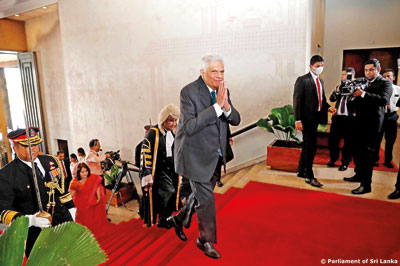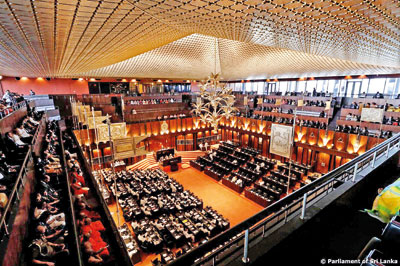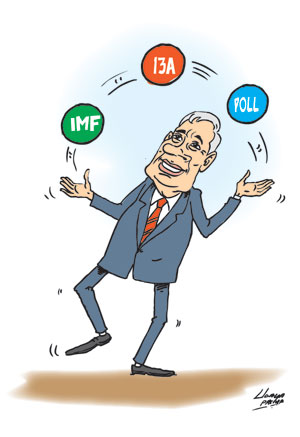Columns
- Suggestions include increasing tax, Customs and Excise revenues; relief for banking and several other sectors
- President pushes ahead with 13A, but unlikely to get support of SLPP
- Uncertainty over local polls continues despite Supreme Court ruling
By Our Political Editor
What of the hundreds if not thousands of Sri Lankans affected in different ways by his actions or inactions? Life has become more than noisy for them, as details of the more than two years of reign by Gotabaya Rajapaksa are unfolding. They are causing a social and economic transformation that threatens to change the fabric of Sri Lanka. This is whilst almost all Sri Lankans are paying the price for hikes in essential consumer items as well as other goods and services.
Among professionals, there is a rush for jobs abroad. The story of one aspect is related by a source in Britain that wishes to remain anonymous for obvious reasons. “The spouse gets an entry into a university for a course of study and the entire family comes over as dependents. This is legal and there is no barrier. They have meagre resources. They find it difficult to obtain accommodation. It is sad and heartbreaking to see these people suffering. One person whom I am helping has come with his wife and three children, the youngest seven years. The wife is mentally shattered, and we took her to the temple. This is the true situation.” However, there are doctors and a few other professionals who have obtained employment and have left or are making arrangements to leave.
An indication of how prevalent this is can be seen in the messages sent out by a leading international bank in Colombo. This is what it said: “Considering moving overseas for work, studies or with family? Get a head start with a pre-setup bank account overseas with HSBC’s International Services which makes settling down so much easier, subject to prevailing foreign exchange regulations…..” Obviously, the bank’s clientele are among those moving out.
Besides the above categories, which constitute a substantial brain drain from the country, there are also others. An air-conditioning firm owner chased after his clients for payment for work done. After prolonged delays, he received a cheque for a higher amount but less than a million rupees. When he presented it at the bank, he was questioned at length – from where he received the money, for what purpose, proof of the repair job done, and details of the client. The owner is winding up his company and has secured an assignment in a West Asian country. He has asked his employees to leave. Such practice, one source said, was becoming common as Finance Ministry officials step up their efforts to collect more funds. Houses and other buildings, even those partly built as well as land, are coming up for sale. This is to raise funds for travel overseas.

President Ranil Wickremesinghe arriving in Parliament on Wednesday to deliver his government's policy statement.
Local council elections
This is amidst two other growing uncertainties. One is the local council elections. There is still growing uncertainty, though not as high as before, as to whether it would be held. Last Friday, the Supreme Court considered two writ petitions filed by a group of opposition MPs, splinter groups from the Sri Lanka Podujana Peramuna (SLPP), seeking an order to hold the local government election.
When the case was taken up before a three-judge bench comprising Justices S. Thurairaja, A.H.M.D. Nawaz and Shiran Gunaratne, the counsel retained by the Election Commission, Saliya Pieris PC, reiterated that the EC was going ahead with the election in keeping with election laws. While noting that government institutions were duty-bound to assist the EC to hold elections in terms of Article 104 of the Constitution, Pieris stated that his clients had encountered several difficulties. The bench pointed out that the EC had given an undertaking to court during a previous hearing that it was working to hold the elections and that it must stand by that undertaking. Pieris said there was no change in the EC’s stance.
Accordingly, the court observed there was no necessity to issue a writ of mandamus to hold the local government polls as the EC has already given an undertaking to court to hold the election in terms of election laws. As such, the SC stated there is no barrier for the EC to proceed with the election process.
The same SC bench on Friday also considered a petition filed by Retired Army Colonel W.M.R. Wijesundara seeking an order suspending the holding of the local government election in view of the prevailing economic crisis. Appearing for the EC, Pieris raised preliminary objections, arguing that there was no legal basis to proceed with the petition. He pointed out that the petition has not named the secretaries of political parties and independent groups that are contesting the election as respondents. Returning officers too have not been named in the petition, he pointed out. The petitioner had also failed to produce the necessary documentation to prove that he is a registered voter in the country, he stressed. The SC postponed further hearings for February 23. The Election Commission is continuing with arrangements for the conduct of the local polls.
In the circumstances, even if local council elections are held, it would be a low-key affair with logistics being affected due to different government directives or restrictions. Nevertheless, its political significance cannot be underestimated, for it will bring to the fore newer political equations. The notion that the Samagi Jana Balavegaya (SJB), the main opposition, is the frontrunner appears to have been overtaken in many areas by the emergence of the Janatha Vimukthi Peramuna (JVP)-led National People’s Power (NPP).

The picture shows empty seats on the opposition side after MPs of the SJB, the NPP and the newly formed Freedom People's Alliance staged a walkout.
13A controversy
The other issue, the full implementation of the 13th Amendment to the Constitution, did raise some eyebrows this week. President Ranil Wickremesinghe had earlier declared that he would implement fully the 13th Amendment. The move was in keeping with assurances given to India’s External Affairs Subrahmanyam Jaishankar and visiting foreign dignitaries. If the President was categoric earlier in his assertion, repeated during the 75th anniversary of Independence, it was more veiled in the policy statement last Tuesday. This is how it was embedded in his speech with a reference to the background:
“Surviving the economic extremity to create a developed economy in our country, would culminate in ensuring peace and harmony among the communities in our nation.
“Both Hon. R. Sambandan and I were elected to Parliament in 1977. We both have a common dream, which is to provide a sustainable solution to the ethnic problem in Sri Lanka while we are both in Parliament. Ever since, we have been discussing that dream and have been making efforts towards its achievement. All previous attempts have failed, but, we wish to succeed this time. We expect your support to this end.
“The conflict in the North and East affected the entire nation and many areas were severely damaged. The Northern Province entirely and several areas in the Eastern and North Central Provinces suffered immensely from the war. We are taking steps to put more weight on the development of these areas. A general plan is being implemented in this regard.
“We know that there are still unresolved issues related to land in the North. In the Jaffna district, there are 3,300 acres of state land including security camps. The extent of 100 acres that had been taken over for the Palali Camp was recently released. A decision has to be made regarding more land to be released for which discussions are being held with the Army and other parties. Discussions have also been initiated regarding the lands around other security camps.
“Not only in the North and East, but also in the other provinces of the country, there is a serious problem regarding the availability of land. Forest lands were determined through a Gazette notification 12 years ago. At that time it was based on GPS maps. Due to the conflict and other reasons, many village lands were gazetted as forests. Now the conflict is over. Due to the reason of lands owned by the people being gazetted as forests, there has been a great injustice to the community. People from Monaragala to Jaffna are facing this problem.
“We will take steps to correct this injustice through re-gazetting the forests and lands according to the 1985 map.
“We are streamlining and expediting the process of tracing missing persons. The mechanism of the Office on Missing Persons will be strengthened. Our attention has also been focused on the people who have been imprisoned for being involved in terrorist activities. They have been imprisoned for many years without trial. We are taking measures to systematically release these prisoners. Drafts are being prepared to establish a National Land Council and a National Land Policy.
“It is alleged that due to certain practices of the Central Government, the powers of the Provincial Councils have been reduced in the fields of education and health. Therefore, we envision bringing new laws regarding the implementation of powers of the Provincial Councils in these fields.
“Amendments will be introduced to the following Acts in order to regularise and streamline the delegation process: The Transfer of Powers (Divisional Secretaries) Act, No. 58 of 1992, the Provincial Councils (Consequential Provisions) Act, No. 12 of 1989 and Provincial Councils (Amendment) Act No. 28 of 1990.
“We expect to establish a modern system for the District Development Councils to streamline the coordination functions between the Provincial Councils and the Central Government. We will present all these Ordinances and Bills to the National Council of the Parliament. The responsibility of making the final decision is assigned to the National Council. DIG divisional boundaries are currently not based on provincial boundaries. Due to this, a number of practical difficulties have arisen. Therefore, we expect to determine the boundaries of DIG divisions according to the provinces. There is no change in police powers…..”
It is known that a sizeable section of the SLPP is not in favour of the full implementation of 13A. The subject did come up at a meeting of the government parliamentary group last Wednesday. President Wickremesinghe allayed apprehensions by saying that there were safeguards and hence there was no cause for worry.
62-page report to revive economy
The National Council of Parliament, which he wants matters in 13A referred to, has dealt at length through a Sub Committee on how to stabilise the country’s economy. Its 62-page second report was submitted to the Council on February 9 and the report is awaiting publication by the Government Printer.
The subcommittee is headed by Patali Champika Ranawaka. Its other members are Nazir Ahamed, Tiran Alles, Sisira Jayakodi, Sivanesathurai Chandrakanthan, Wajira Abeywardena, A.L.M. Athaulla, Rishard Bathiudeen, Palani Thigambaram, Mano Ganeshan and M. Rameshwaran.
The National Council was established with the objective of stabilising the economy by setting up general priorities in parliament to create short, medium, and long-term policies. It aims to create agreement between short, medium, and long-term programmes to stabilise the economy, and organise special meetings between cabinet ministers, the National Council, and the special parliamentary committee chairman’s youth organisation observers.
At the national council meeting held on October 29, 2022, the Secretary General of the parliament suggested appointing a Sub-committee of the National Council in identifying short and medium-term programmes related to economic stabilisation.
The subcommittee had held discussions with state employees and experts on debt restructuring, shortage of drugs and health, food and nutrition, social security, power and energy as well as Transport. Apart from that, it also focused on issues and solutions in sectors such as law and reforms, collections of revenue, banking entrepreneurship, gem and jewellery, textile, tourism, information technology, media and construction.
Therefore, meetings were held with experts and stakeholders on these subjects from November 15, 2022 to January 11, 2023.
The sub-committee made note that five committees of experts appointed by the Justice Ministry have suggested introducing new laws and bringing amendments to existing laws. The Ministry is taking steps to adopt 55 draft bills in this regard.
There were issues in the legal sector: State officers and institutes have very limited financial accountability. There are huge delays in court cases — delays of court cases in commercial high courts. Fraudulent activities and shortcomings in the actions of the Sri Lanka Board of Investment discourage foreign investment. There are no legal policies to regulate digital currency transactions. There are also delays on the part of the Attorney General’s Department when checking the legality of bilateral agreements on investment.
The sub-committee has noted that 507,095 persons and companies have registered with the Inland Revenue Department (IRD) by the end of 2021 as opposed to 1.4 million in 2019.
In 2019, the IRD collected Rs. 1,025 billion in taxes, but in 2020, due to the tax relief and other factors tax revenue collected dropped to Rs 523 billion. In 2022, with the new tax reforms, a Rs 915 billion revenue was earned, while in 2023, the collective estimated revenue is Rs 1,667 billion. Due to new income tax registrations, the number of taxpayers has risen to 1.6 million.
Some of the problems identified are: opening tax files for 18 million persons over the age of 18 exceeds department capacity; there is no mechanism to access the income status of income earners due to uncontrolled facial transactions; there are many professions and businesses which earn incomes but do not register as revenue earners; money laundering and covering up of income have restricted revenue collection.
Among solutions are: opening a tax file for everyone who is above the age of 18 according to his or her Identity card number. This can be done with the collaboration between the Registrar of Persons, the Election Commission, and the Inland Revenue Department.
Create social equality in tax collection, keeping to the principle that indirect and direct taxes ratio should be 60:40. Create a mechanism to learn income earners’ quality of life by having identity numbers, tax document numbers essential in electricity bills, water bills and telephone bills, vehicle registration, and use a digital system to confirm person’s identity. Include professions and businesses not included in the income tax network.
The sub-committee learned that the revenue earned by the Customs in 2014 was 518 billion and it had reached 919 billion in 2018 and had dropped to 641 billion in 2020. The reason for this is tax relief, Covid -19 pandemic-related business restrictions and restricting imports.
The problems faced by the Customs are difficulty in estimating the value of imported goods, limitations on scanning facilities, political influence and the possibility of people carrying gold jewellery without being checked. Among the solutions proposed are a new policy on taking gold out of the country and increasing mechanical systems on valuing personal taxes.
The subcommittee made observations that the Excise Department is facing the possibility of losing its income due to the economic crisis. This concern is due to a lack of demand for liquor manufactured legally. In addition, the industry is hit by the collapse of tourism, transportation issues due to the power crisis, different taxes, shortage of ingredients to make liquor, shortage of bottles, and bottle caps, and a ban on ethanol importation.
Among the solutions: increase local coconut, Kithul, Palmyra toddy products, improve sugarcane and corn cultivation to use locally produced ethanol, improve the cultivation of tobacco, and improve local cigarette production to break the monopoly.
Among the main issues in the banking sector have been the drop in foreign reserves, the liquidity of the banking sector weakening, and huge interest rates in the market. Among the solutions offered are: re-structuring local loans and foreign loans, introducing new laws for banking, leasing and insurance sectors, reviewing the ban on important items, and providing relief to debtors of formal and informal banking sectors.
Among the other sectors covered by the subcommittee were gem and jewellery, garment, tourism, information technology and computer-based business. The sub-committee also looked into the social security network; it was revealed that after the economic crisis, around 1.1 million families were newly included in the priority list of Samurdhi beneficiaries. Apart from that, a shortage of food, and an increase in the number of people who are unable to afford food. This has left an increasing number of children, pregnant women, and the elderly food insecure as there is no private or state programme to address the issue. With the economic difficulty, the suicide rate of people has increased many times.
As a solution, it was proposed that the current gazette notification should be implemented with regard to Samurdhi beneficiaries and incorporate insurance schemes into social protection programmes.
In light of these developments, a worrying factor has been the gradual deterioration of the law and order situation. An intended economic stabilisation would have to be accompanied by stricter enforcement of the laws and for this purpose the Police role becomes a key factor. The Police, including their premier investigation arm, the Criminal Investigation Department (CID), have not been able to solve a spate of recent murders. There has been an erosion of discipline and very little attention appears to be focused on this important area.
Buying or selling electronics has never been easier with the help of Hitad.lk! We, at Hitad.lk, hear your needs and endeavour to provide you with the perfect listings of electronics; because we have listings for nearly anything! Search for your favourite electronic items for sale on Hitad.lk today!


National Council proposes wide-ranging economic reforms
View(s):